

TEDxBerkeley - Nipun Mehta - Designing For Generosity. In These Times - Give It Away. Give It Away By David Graeber Have you noticed how there aren't any new French intellectuals any more?
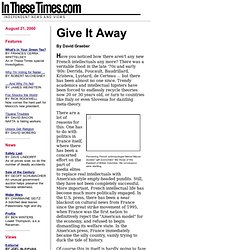
There was a veritable flood in the late '70s and early '80s: Derrida, Foucault, Baudrillard, Kristeva, Lyotard, de Certeau ... but there has been almost no one since. Trendy academics and intellectual hipsters have been forced to endlessly recycle theories now 20 or 30 years old, or turn to countries like Italy or even Slovenia for dazzling meta-theory.
There are a lot of reasons for this. Of course this in itself is hardly going to faze the sort of Americans who read Deleuze and Guattari. As a result, some of the most interesting scholars in France today you never hear about at all. GiftCircleSeedpacket.doc. The Economics of the Gift. News: The ideal of self-sufficiency puts brakes on sharing economy - Aalto University. According to a recent study, fear of owing a debt of gratitude and reluctance to ask for help are slowing the success of online services that facilitate joint use, borrowing and exchange of services.
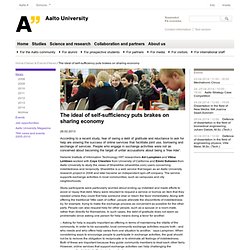
People who engage in exchange activities were not as concerned about becoming the target of unfair accusations about being a ‘free rider’. Helsinki Institute of Information Technology HIIT researchers Airi Lampinen and Vilma Lehtinen worked with Coye Cheshire from University of California and Emmi Suhonen from Aalto University to study the views of Sharetribe (sharetribe.com) users concerning indebtedness and reciprocity. Sharetribe is a web service that began as an Aalto University research project in 2008 and later became an independent spin-off company. The service supports exchange activities in local communities, such as campuses and city neighborhoods.
Study participants were particularly worried about ending up indebted and made efforts to avoid or repay that debt. Publications - The Gift - Lewis Hyde. By now a modern classic, The Gift is a brilliantly orchestrated defense of the value of creativity and of its importance in a culture increasingly governed by money and overrun with commodities.
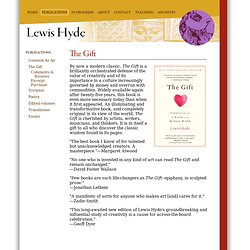
Widely available again after twenty-five years, this book is even more necessary today than when it first appeared. An illuminating and transformative book, and completely original in its view of the world, The Gift is cherished by artists, writers, musicians, and thinkers. It is in itself a gift to all who discover the classic wisdom found in its pages.
"The best book I know of for talented but unacknowledged creators. Radical Generosity by Paul Van Slambrouk. What’s better than turning a profit by selling your work?
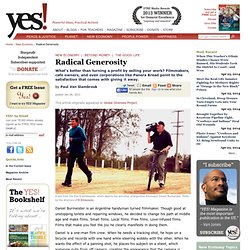
Filmmakers, cafe owners, and even corporations like Panera Bread point to the satisfaction that comes with giving it away. posted Jan 04, 2013 This article originally appeared at Global Oneness Project. A still from the film El Ambulante, which depicts the activities of Argentine filmmaker Daniel Burmeister. Photo by the directors of El Embulante. Daniel Burmeister is an Argentine handyman turned filmmaker. Daniel is a one-man film crew. What makes someone come alive is a gift that they do not possess. Create More Value Than You Capture. As alternative energy advocate Steve Baer once noted, the commons is often ignored in economic analysis.
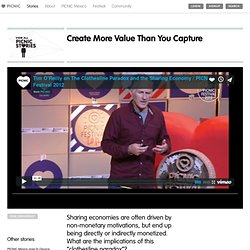
He used a humble analogy to name this "the clothesline paradox": When you put your clothes in the dryer, the energy you use is measured and counted, but when you hang them on the line, the energy "disappears" from the measured economy. But it doesn't disappear from the real economy. In fact, the value that has been created surfaces in unexpected ways. In this talk, Tim O'Reilly explores how sharing economies are subject to the clothesline paradox. While there are often non-monetary motivations driving these economies, they end up being directly and indirectly monetized. "When you build things for the love of it, jobs will emerge and as a result", read PICNIC's report on Tim O'Reilly talk at PICNIC Festival 2012.
RSA Animate - Superfreakonomics. Crowdfunding the commons. The Social Coin is a NGO fully dedicated to producing and distributing coins that initiate chains of random acts of kindness, which can be followed and measured.
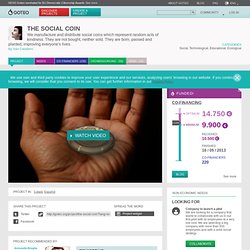
How does it work? 1. When handling a coin, think about the act of kindness you're going to do. It can be helping someone you know, or a complete stranger. 2. Report what you're going to do on the website. Pay it forward Main features It’s a proven fact, random act of kindness improve people's lives both for the giver, and the receiver. Gift Currency. A new project called datti is offering a way to build gift economies on a community level by witnessing and memorializing gift transactions using beautiful, pewter coins.
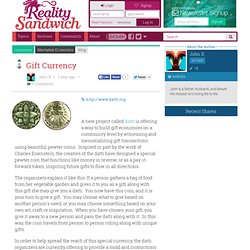
Inspired in part by the work of Charles Eisenstein, the creators of the datti have designed a special pewter coin that functions like money in reverse, or as a pay-it-forward token, inspiring future gifts to flow in all directions. The organizers explain it like this: If a person gathers a bag of food from her vegetable garden and gives it to you as a gift, along with this gift she may give you a datti. You now have this coin, and it is your turn to give a gift. You may choose what to give based on another person's need, or you may choose something based on your own art, craft, or inspiration.
When you have chosen your gift, you give it away to a new person and pass the datti along with it.